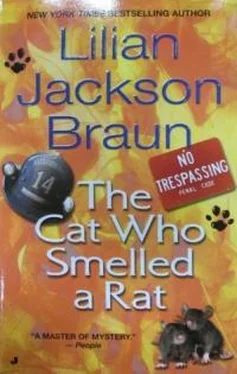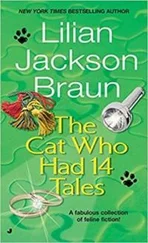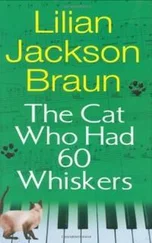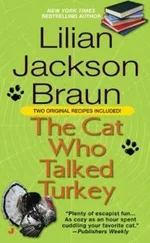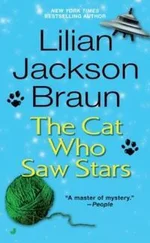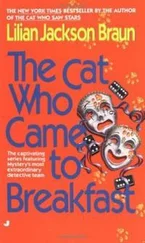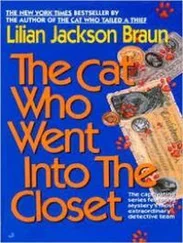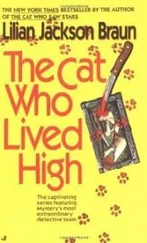“How come you didn’t play the bagpipe at Eddington’s funeral, Andy?”
“Nobody asked me to. Know anything about the fire?”
“This may be hearsay, Andy, but I was told that a guy from Bixby was trying to buy the whole block for redevelopment. Nobody would sell. Then Edd died, and the bookstore-the kingpin of the block-blew up! It doesn’t take much imagination to suspect arson.”
Brodie grunted.
“And that’s not all. Eddington’s cat escaped unharmed. How-and why-did he get out? He was an indoor cat. Did he sense danger when an unauthorized stranger unlocked the door and came in? Did he sneak out and hide in the weeds? The key was under the doormat. That’s where everyone puts the key, isn’t it? In Moose County, at least. No matter how much you try to educate them, people will still leave their door keys under the doormat and the car keys in the ignition. So I say the arsonist is a local and not a pyromaniac from Down Below.”
“Good!” said Brodie. “That narrows the suspects down to a few thousand.”
Qwilleran started to leave the office. “Don’t say I never gave you a tip!”
Loafing around Main Street, the coffee shops, and the post office, Qwilleran heard the man on the street:
“Downtown won’t be the same without that building!” “I remember it ever since I was a li’l tyke!” “People came from all over and took pictures of it.” “My old man said it used to be a blacksmith shop.” There was not one word about the thousands of books that had been reduced to ash.
Qwilleran managed to take a nap before dressing for dinner with the Morghans. Barry, manager of the Mackintosh Inn, was renting the apartment in the Klingenschoen carriage house. He had the careful grooming and cordial manner of his profession. His brother, Theo, the dermatologist, was a young man with a neatly clipped beard that brought to Qwilleran’s mind Polly’s theory: patients have more confidence in a doctor with a neatly clipped beard. The doctor’s wife, Misty, was all smiles and curly brown hair and mischievous brown eyes. Like Qwilleran himself, they were Chicagoans, with a city veneer that was recognizable in a small town. Qwilleran’s veneer was wearing thin.
The conversation started with the usual get-acquainted formula: “Yes, we’ve bought a big old house on Pleasant Street… . No. We haven’t any kids yet, but we want a family, and this looks like a good community for rearing them… . Yes, we have pets. Two Yorkies… . No, we’ve never lived in a town smaller than Chicago.”
“I think it’ll be fun!” said Misty.
“But we have a lot to learn,” Theo added.
“For one thing,” Qwilleran said, “you can expect your patients to call you Dr. Theo-not Dr. Morghan. It combines neighborliness with respect.”
“Everyone seems very friendly,” Misty commented.
“True. And everyone will want to know everything about you. Data will then be exchanged in the coffee shops, on the church steps, at the post office, and over the phone. It’s not gossip. It’s caring and sharing… . Got it?”
“Got it!” the couple said in unison.
“By the same token, never speak unkindly about anyone, because you may be talking to a brother-in-law, second cousin, neighbor, or golf partner.”
Barry said, “Qwill, when I first came here, you told me to keep my ears open and my mouth shut. Priceless advice! In the same class with: Look both ways before crossing the street.”
The host served cocktails, and Qwilleran had to explain Squunk water-from a local mineral spring with a believe-it-or-not history.
“Tell it!” Misty urged.
“You’ll have to wait and buy the book. It’s one of my collection of Moose County legends to be titled Short & Tall Tales.”
Then Theo asked about the mayoral election campaign. He had seen some unusual posters and newspaper ads.
“Juicy question!” Qwilleran said with relish. “In a nutshell, the incumbent was a high school principal who resigned following a scandal involving girl students-resigned without censure, because his mother was a Goodwinter! Four Goodwinter brothers founded Pickax and operated the most famous, or infamous, mine. Ancestors count heavily here.”
“I can see that!”
“So Mrs. Goodwinter’s little boy grew up to be mayor, elected and reelected because … all together now!”
“His mother was a Goodwinter!” the other three chimed.
“He earns his living as an investment counselor.”
“A handsome dog,” Barry said. “Every time he comes into the inn, people fawn over him.”
“Although they whisper about his integrity when they’re in safe company.”
“This is great!” said Barry with a roguish grin.
“Now we come to the good part,” Qwilleran went on. “For a long time we’ve had a spunky, outspoken woman on the city council. She could challenge the mayor with impunity because her father was a Goodwinter. That gave her an edge by local standards.”
Misty asked, “Is she the Amanda Goodwinter who has the design studio? I’ve only met her assistant, but they’re handling my artwork.”
“She’s the one! Her friends have finally convinced her to run for the mayor’s office. It’s a joke! He’s good-looking, suave, and well dressed; Amanda looks grouchy and dresses like a scarecrow. That’s the kind of individuality the locals enjoy. Do you have today’s paper, Barry?”
Qwilleran showed them two campaign ads: a photo of a handsome man with the slogan Reelect Mayor Blythe!, and a caricature of a witch with the slogan We’d Rather Have Amanda!
Misty clapped her hands, and Theo said, “I hope it’s not too late to register to vote.”
The doorbell rang. Chef Wingo was sending over a paella-a dish of chicken, rice, shrimp, and the Spanish sausage called chorizo. During dinner, conversation touched on many topics.
Barry said that the country club was giving a reception for the two doctors and their wives. Theo’s partner was an avid golfer.
Theo said that he and Misty preferred curling as a sport. “I discovered it while in med school in Michigan. We want to join the curling club.”
Misty remarked about the spectacular murals in the Pickax post office, and Qwilleran explained, “They were painted during the Great Depression, as part of the federal works project, depicting Moose County’s history: mining, lumbering, quarrying, shipbuilding, and farming.”
Barry was amazed at the huge number of volunteers signing up for the Citizens’ Fire Watch. An editorial in the Something had said, “The blood of pioneers still flows in the veins of their descendants, giving them a sense of community responsibility.”
Misty said that the art center had invited her to give a demonstration lecture on batik painting.
“I have one of your wall hangings,” Qwilleran told her. “Fran Brodie sent it over to give the living room a splash of color.”
“Are they robins? I did two hangings on that theme, titled Two Robins with Worm’ and Two Robins without Worm.’ Which do you have?”
“With,” he said.
“That’s my favorite. It’s more dynamic.”
After one of Chef Wingo’s simple desserts-melon cubes with lime sorbet and mango sauce-the party broke up in a flurry of handshakes and pleasant words, and Qwilleran hurried home for a dish of ice cream with chocolate sauce and redskin peanuts.
As he unlocked the front door he could hear the urgent baritone yowling in the foyer. Koko was telling him that there was a message on the answering machine.
It was from Rhoda Tibbitt. “Homer and I were shocked to hear about the bookstore, Qwill. Eddington had told us he was leaving it to you. Do you have time to drop in for tea tomorrow afternoon? We have some information that Homer thinks you ought to know.”
Читать дальше
